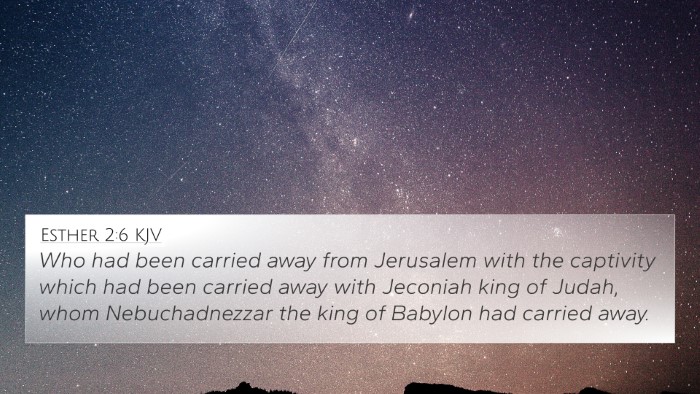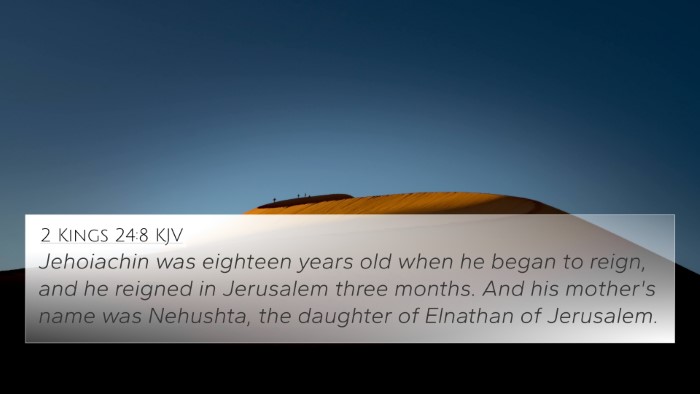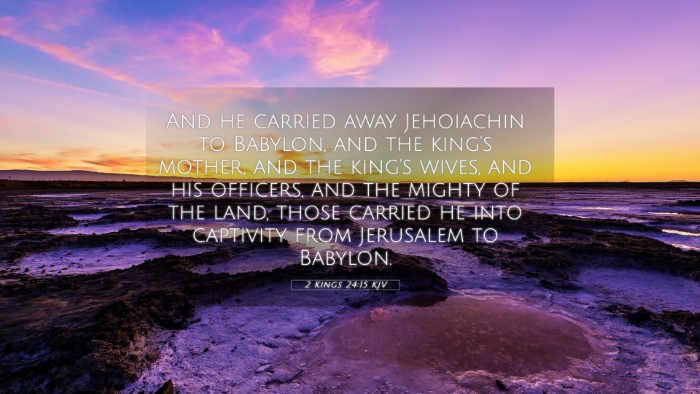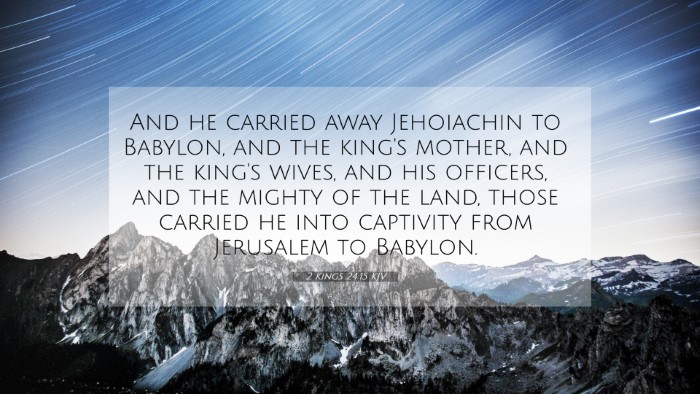Old Testament
Genesis Exodus Leviticus Numbers Deuteronomy Joshua Judges Ruth 1 Samuel 2 Samuel 1 Kings 2 Kings 1 Chronicles 2 Chronicles Ezra Nehemiah Esther Job Psalms Proverbs Ecclesiastes Song of Solomon Isaiah Jeremiah Lamentations Ezekiel Daniel Hosea Joel Amos Obadiah Jonah Micah Nahum Habakkuk Zephaniah Haggai Zechariah Malachi2 Kings 24:15 Similar Verses
2 Kings 24:15 Cross References
And he carried away Jehoiachin to Babylon, and the king's mother, and the king's wives, and his officers, and the mighty of the land, those carried he into captivity from Jerusalem to Babylon.
Uncover the Rich Themes and Topics of This Bible Verse
Listed below are the Bible themes associated with 2 Kings 24:15. We invite you to explore each theme to gain deeper insights into the Scriptures.
2 Kings 24:15 Cross Reference Verses
This section features a detailed cross-reference designed to enrich your understanding of the Scriptures. Below, you will find carefully selected verses that echo the themes and teachings related to 2 Kings 24:15 KJV. Click on any image to explore detailed analyses of related Bible verses and uncover deeper theological insights.

2 Chronicles 36:10 (KJV) »
And when the year was expired, king Nebuchadnezzar sent, and brought him to Babylon, with the goodly vessels of the house of the LORD, and made Zedekiah his brother king over Judah and Jerusalem.

Esther 2:6 (KJV) »
Who had been carried away from Jerusalem with the captivity which had been carried away with Jeconiah king of Judah, whom Nebuchadnezzar the king of Babylon had carried away.

Jeremiah 22:24 (KJV) »
As I live, saith the LORD, though Coniah the son of Jehoiakim king of Judah were the signet upon my right hand, yet would I pluck thee thence;

2 Kings 24:8 (KJV) »
Jehoiachin was eighteen years old when he began to reign, and he reigned in Jerusalem three months. And his mother's name was Nehushta, the daughter of Elnathan of Jerusalem.

Ezekiel 17:12 (KJV) »
Say now to the rebellious house, Know ye not what these things mean? tell them, Behold, the king of Babylon is come to Jerusalem, and hath taken the king thereof, and the princes thereof, and led them with him to Babylon;
2 Kings 24:15 Verse Analysis and Similar Verses
Meaning and Interpretation of 2 Kings 24:15
Bible Verse: 2 Kings 24:15 - "And he carried away Jehoiachin to Babylon, and the king's mother, and the king's wives, and his officers, and the mighty of the land, those carried he into captivity from Jerusalem to Babylon."
This verse encapsulates a pivotal moment in the history of Judah and offers rich insights into the themes of exile, divine judgment, and the sovereignty of God. Below, we summarize the meanings drawn from accessible public domain commentaries, structured to reflect the verse's theological significance.
Contextual Background
The context of this verse is critical to understanding its implications. Jehoiachin, the king of Judah, was taken captive by Nebuchadnezzar during a time when Babylon was a rising power. This event marks a significant turning point in Israel's history and highlights the fulfillment of prophetic warnings against the unfaithfulness of the kings of Judah.
Commentary Insights
-
Matthew Henry:
Henry emphasizes the significance of exile as both a punishment and a means of purging the nation of its idolatry. This event demonstrated God's strong hand in controlling history and nations, indicating that no earthly power can thwart God’s plan.
-
Albert Barnes:
Barnes explains that the carried away included not just Jehoiachin but also his family and influential figures, which served to cripple Judah’s leadership. This act of exile was indicative of God’s anger against the nation's rebellion and a reminder of the ultimate authority of Babylon as ordained by God.
-
Adam Clarke:
Clarke provides an extensive analysis of the cultural significance of the captives. The removal of the king’s family signifies the complete subjugation of Judah, and the socio-political ramifications would resonate deeply for generations. The verse serves as a lamentation for what was lost and a warning against further disobedience to God.
Thematic Connections
2 Kings 24:15 encourages a deeper examination of biblical themes of captivity and restoration, as well as the interconnectedness of scripture. The following thematic Bible verse connections show relational dynamics across the scripture:
- Jeremiah 25:11-12: Prophetic reference to the Babylonian captivity as a divine consequence.
- Daniel 1:1-3: Contextualizes the exile of Judah’s leaders as part of the overarching Babylonian conquests.
- Lamentations 1:3: Illustrates the suffering of the people post-exile, underscoring the reverberations of this pivotal event.
- Ezekiel 17:12-14: Further portrays the consequences of disobedience and the fall of Jerusalem.
- Jeremiah 29:10: Offers hope and the promise of eventual restoration following the Babylonian captivity.
- 2 Chronicles 36:20-21: Reiterates the prophetic dimensions of the exile and God’s overarching will.
- Hebrews 11:24-26: Connects the faith of Moses in the context of an earthly kingdom's oppression, relatable to the themes of exile.
Bible Cross-References Tool
Understanding cross-references is essential for a comprehensive interpretation of biblical text. Tools for Bible cross-referencing can assist in identifying these connections effectively.
Cross-Reference Bible Study Methods
- Utilizing a Bible concordance to find related verses by keywords.
- Applying cross-reference systems that highlight scriptural parallels.
- Engaging in a comparative study to explore thematic elements across books.
Conclusion
2 Kings 24:15 is more than a historical note; it is a divinely inspired reminder of God's judgment and mercy. Through the lens of public domain commentaries and cross-referencing biblical texts, we gain insights that inform our understanding of both the immediate context and the broader narrative of scripture. The lessons of this verse resonate throughout the Bible, reminding believers of the consequences of disobedience and the hope for redemption.
Further Study
For those interested in delving deeper, consider exploring links between the Prophets and New Testament teachings, examining how themes of exile articulate through varying contexts across scripture.


